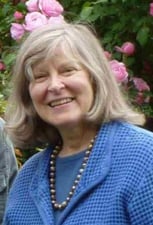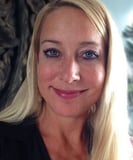A guest post by Bonnie Bright, Ph.D.
If the name, Linda Buzzell, sounds familiar to you, it’s no surprise—particularly if you are moved as I am by the growing ecological crisis that is unfolding around us. Linda Buzzell, MA, LMFT, PDC (Permaculture Design Certificate) has been a psychotherapist for more than 30 years and has specialized in ecopsychology and ecotherapy since 2000. She co-edited the 2009 Sierra Club Books anthology, Ecotherapy: Healing with Nature in Mind. From my perspective, Linda is a true pioneer in the field, with a wonderful gift for sharing her passion for the planet in a multitude of ways that appeal to a broad audience.
In addition to writing regularly for Huffington Post, Linda generously shares her time to do interviews and events that illustrate the value (and, arguably, the imperative) of reconnecting with the natural world. Linda recently joined me as a panelist for an online event, “Earth, Climate, Dreams” sponsored by Depth Psychology Alliance, and she is leading an upcoming weekend workshop, Ecotherapy: Nature Reconnection as a Powerful, Transformational Healing Practice, at Pacifica Graduate Institute in Santa Barbara, May 13-15, 2016.
Linda recently sat down with me to answer a few questions about the power of ecotherapy:
BB: Why were you first drawn to ecotherapy?
LB: I grew up in rural Canada and nature was a powerful healer when my mother died. After years of being an indoor psychotherapist, I rediscovered the amazing power that nature has to heal when I moved to my current home. I was amazed how time spent communing with and tending my garden could raise my mood and calm anxieties. That inspired me to do research about ecopsychology and apply various nature connection practices in my therapy practice. And that in turn led to Craig Chalquist and I editing Ecotherapy: Healing with Nature in Mind for Sierra Club Books, where we gathered insights from people like Joanna Macy, Meredith Sabini (The Earth Has a Soul: Jung, Technology and Modern Life), Bill McKibben, Theodore Roszak (The Voice of the Earth), David Orr, Jungian analyst Mary-Jayne Rust, Andy Fisher (Radical Ecopsychology), Stephen Aizenstat, Richard Louv, Robert Greenway and many others.
BB: That book is indeed a remarkable collection of many inspiring individuals who are contributing to this field. It has been on my own bookshelf pretty much since it came out, and I often turn to it for ideas and inspiration. Many of the works in that anthology focus on the power of reconnecting with the natural world. In what ways do you personally see nature reconnection practices are “powerful medicine”?
LB: On a purely scientific level, more and more robust research is showing how even a tiny touch of contact with the many aspects of nature (within our own bodies, our consciousness, in our gardens, with animals or in the wilderness) has demonstrable, measurable healing results. And of course the process is much deeper than that! Modern people have been living in cages imposed by our own worldviews and economic/political structures and suffer from what Richard Louv calls "nature deficit disorder." Helping people escape from those cages is exciting work!
BB: To give an idea of some of those “cages” you mention: Many people are increasingly experiencing symptoms like eco-anxiety; numbing, apathy, or dissociation; or even environmental illnesses where substances in the environment make us sick. How can ecotherapy offer solutions for those who feel they are suffering due to ecological issues?
LB: Ecotherapy addresses the escalating issues arising from our degrading environment. As Jungian analyst and author, Jerome Bernstein, points out, very sensitive people are especially aware of and affected by the earth's pain and the pain of the many species, including humans, who suffer from our mistreatment of the earth. The upcoming workshop I’m leading at Pacifica will include learning about some of the "cultural ecotherapies” that treat conditions specific to our historical moment, such as eco-anxiety, eco-grief, eco-trauma, eco-shame, eco-despair and trauma from forced migration," solastalgia and environmental melancholia, or the "waking up syndrome" that arises as we fully grok the enormity of environmental and social challenges. Ecotherapists may be considered important first responders at any environmental trauma scene, using techniques to facilitate transition and restoration of the community commons, to help build personal and community eco-resilience, and to serve as catalysts in the collective recovery from consumerism.
BB: Ecotherapists as first responders—What a powerful image! It’s a metaphor that engenders a visceral or embodied understanding of what is needed to address the urgency of reconnection with the natural world. What are some of the applied ecopsychology methods currently being practiced in consulting rooms and outdoor spaces that appeal to you most?
LB: My own favorite is horticultural therapy, because I love plants and gardens. Animal-assisted therapies are also really exciting too, as are the wilderness therapies, which can be highly transformative by facilitating intimate contact with non-human-controlled nature for specific, intense periods of time.
BB: In general, why should we, as individuals, really care about this initiative? Who can benefit from learning more about ecotherapy?
LB: The research is now driving the field forward to new applications with multiple populations using multiple methods. Teachers, therapists, doctors, coaches, counselors, public health workers, parks and recreation specialists, urban designers and other professionals are all beginning to include nature connection practices in their fields, because they work! Prisons, schools, care farms, violent neighborhoods, outdoor psychotherapy, and Alzheimers facilities are some of the many places that now including nature connection practices in their healing protocols.
 for Linda's upcoming workship in Santa Barbara, May 13-15.
for Linda's upcoming workship in Santa Barbara, May 13-15.
 Linda Buzzell, MA, LMFT, PDC (Permaculture Design Certificate), has been a psychotherapist for more than 30 years and has specialized in ecopsychology and ecotherapy since 2000. She and Craig Chalquist edited the Sierra Club Books anthology Ecotherapy: Healing with Nature in Mind, a core text in clinical ecopsychology. She is a member of the Editorial Board of Ecopsychology, the peer reviewed journal of the field, and was a keynote speaker at the 2014 Ecotherapy Symposium at the University of Brighton in the UK. She is Adjunct Faculty at Pacifica Graduate Institute. In 2002 she founded the International Association for Ecotherapy and is co-founder of the Ecopsychology Network of Southern California. She blogs on ecopsychology and ecotherapy at The Huffington Post. She is a member of the Ecopsychology Network for Clinicians, where she taught “The HOW of Ecotherapy.” In 2006 she received her Permaculture Design Certificate and with her husband Larry Saltzman has created a food forest around her home that serves as her ecotherapy office. For further information, www.ecotherapyheals.com and www.huffingtonpost.com/linda-buzzell
Linda Buzzell, MA, LMFT, PDC (Permaculture Design Certificate), has been a psychotherapist for more than 30 years and has specialized in ecopsychology and ecotherapy since 2000. She and Craig Chalquist edited the Sierra Club Books anthology Ecotherapy: Healing with Nature in Mind, a core text in clinical ecopsychology. She is a member of the Editorial Board of Ecopsychology, the peer reviewed journal of the field, and was a keynote speaker at the 2014 Ecotherapy Symposium at the University of Brighton in the UK. She is Adjunct Faculty at Pacifica Graduate Institute. In 2002 she founded the International Association for Ecotherapy and is co-founder of the Ecopsychology Network of Southern California. She blogs on ecopsychology and ecotherapy at The Huffington Post. She is a member of the Ecopsychology Network for Clinicians, where she taught “The HOW of Ecotherapy.” In 2006 she received her Permaculture Design Certificate and with her husband Larry Saltzman has created a food forest around her home that serves as her ecotherapy office. For further information, www.ecotherapyheals.com and www.huffingtonpost.com/linda-buzzell
 Bonnie Bright, Ph.D., a graduate of Pacifica’s Depth Psychology program, is the founder of Depth Psychology Alliance, a free online community for everyone interested in depth psychologies, and of DepthList.com, a free-to-search database of Jungian and depth psychology-oriented practitioners. She is also the creator and executive editor of Depth Insights, a semi-annual scholarly journal, and regularly produces audio and video interviews on depth psychological topics. Bonnie has completed 2-year certifications in Archetypal Pattern Analysis via the Assisi Institute; in Technologies of the Sacred with West African elder Malidoma Somé, and has been extensively involved in Holotropic Breathwork™ and the Enneagram.
Bonnie Bright, Ph.D., a graduate of Pacifica’s Depth Psychology program, is the founder of Depth Psychology Alliance, a free online community for everyone interested in depth psychologies, and of DepthList.com, a free-to-search database of Jungian and depth psychology-oriented practitioners. She is also the creator and executive editor of Depth Insights, a semi-annual scholarly journal, and regularly produces audio and video interviews on depth psychological topics. Bonnie has completed 2-year certifications in Archetypal Pattern Analysis via the Assisi Institute; in Technologies of the Sacred with West African elder Malidoma Somé, and has been extensively involved in Holotropic Breathwork™ and the Enneagram.



